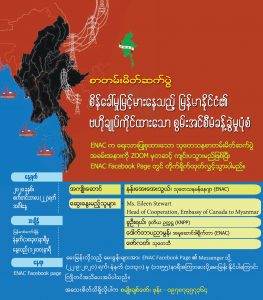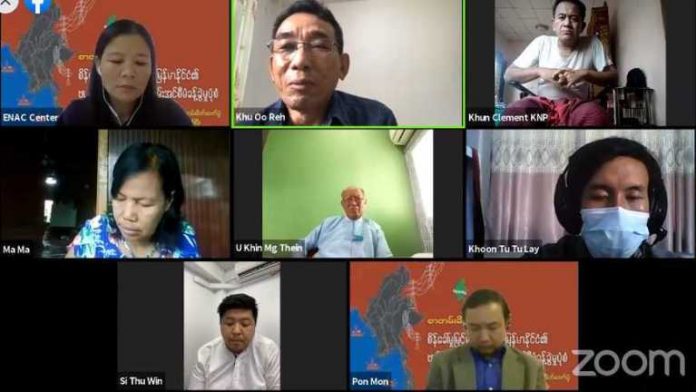Although the Union Peace Conference (UPC) has been held four times, there are still many questions about how many agreements have been reached to achieve a federal system, said Khu Oo Reh, Vice Chair of the Karenni National Progressive Party ( KNPP).
His comments were made at an online ceremony held on 22 September, called ‘‘Challenging Myanmar’s Centralized Energy Model”.
The ceremony included officials from the Ethnic Nationalities Affairs Center (ENAC) an independent resource, training, and education center supporting the peace process and development of democratic institutions in Burma. Others in attendance included an official from the Canadian Embassy in Myanmar, some ethnic armed leaders, civil society organizations and members of the media.
Speakers raised issues about the peace process and its relationship with energy development projects taking place within the country.

(copy)
“The NCA is a gateway to peace for political dialogue. But they are not [fully] open, [just open] 50 percent. We discuss at the peace conference and we report our agreements on the UEC. Now, we have held the conference and reported to the UPC four times. We have a lot of questions about how many federal agreements are included in the Union Peace,” stated Khu Oo Reh.
The Vice Chair also criticized the Nat-ta-bet Chaung hydropower project. He indicated there has been no transparent cooperation on the project to be built in Kayah State under the NLD government. He added, the Lawpita hydropower, which was mainly used in Rangoon and Mandalay divisions under the previous government, still produces no electricity in Kayah State.
Locals from Kayah state are not allowed to use the Lawpita electricity generated in their area. Khu Oo Reh, went further citing that locals have suffered human rights abuses due to the planting of bombs in the area.
U Zaw Latt, author of the book and theme of the ceremony, ‘‘Challenging Myanmar’s Centralized Energy Model agreed the power plant situation has posed a threat to peace.
“The 17-year KIO ceasefire agreement has been rescinded based on the security situation at a power plant in Kachin State. If other ethnic areas attack, the union may disintegrate. Worst of all, It is possible that the country will be in a state where the administrative machinery is completely destroyed. Fighting continues in Rakhine State. If the ethnic areas that Karen, Shan, Kachin, were to fight — the union may disintegrate, which is very dangerous.” said, U Zaw Latt.
Despite Myanmar’s need for energy, most of its natural gas is being exported. U Zaw Latt pointed out that Yadanar and Yedagun offshore gas from 2010-2018 was exported to Thailand for US $15.37 billion. Meanwhile, Shwe Gas in Rakhine State sold more than $ 180 billion under a 30-year contract to China, and it is not clear where that revenue would go.
Dr. Pon Nya Mon, Executive Director of Ethnic Nationalities Affairs Center (ENAC), suggested that the energy issue should be addressed at the next Union Peace Conference as it is an unavoidable issue in development and peace issues.
“Energy and Development are related to peace, because the energy is associated with natural resources and land, so that issue needs to be discussed in the UPC inevitably,” said Dr. Pon Nya Mon.

